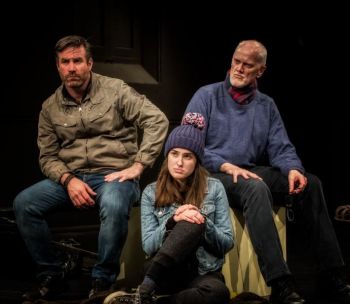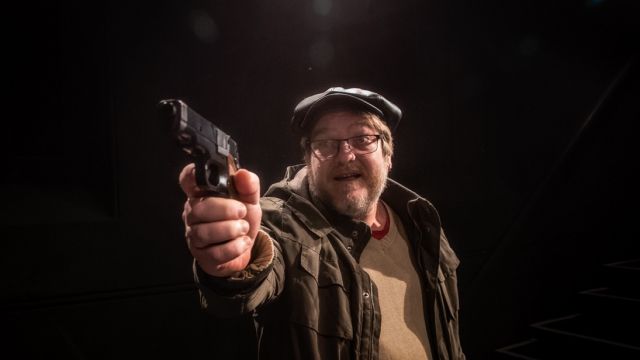The Man from Earth
There is nothing more certain, they say, than death and taxes. Mortality hangs over the head of each and every person on this planet. Some welcome it, some seek it, some fear it, some predict it, some ignore it. In this wonderfully challenging play The Man from Earth, we are faced with the question- what if we could be immortal? What would one do, faced with the prospect of living on and on, seeing those around you age and pass, but continuing to stay frozen in time?
As an avid science fiction fan and a lover of Jerome Bixby’s work in Star Trek and on the story Fantastic Voyage, I arrived with curiosity and a small dose of excitement to see Red Phoenix’s production of The Man from Earth. I was not disappointed. I was confronted and made to think.
The Man from Earth is a stage adaptation of a cult sci-fi movie of the same name. Jerome Bixby originally addressed the idea of immortality in an episode of Star Trek in the 60’s and finally wrote the screen play for this story on his deathbed in 1998, dictating much of the script to his son Emerson. From here, Emerson produced the script as an independent film, which now has a cult following.
The story revolves around Professor John Oldman (Fahad Farooque), his name itself a play on words and a hint to those around him of his truth. When John misses his farewell send-off at the university a group of his friends come to say goodbye and try and understand why he is making a sudden departure. Early in the scene John is packing his belongings, preparing to move to a new home. Here, we are teased by the writer with small pointers toward the reality behind John’s situation- a stone age tool, a supposed portrait by Van Gogh. In Act 1 we are introduced to John’s colleagues and heshocks them with his earth shattering secret for his premature retirement- he is a 14000 year old immortal man- a cro-magnon, who stopped aging at 35 and for 140 centuries has roamed the earth. He must move on and cannot stay in one place for more than ten years without his secret being discovered. Tempers and emotions rise as John's fellow professors attempt to debunk his story, but it soon becomes obvious that it is as impossible to disprove as it is to verify. A happy farewell party soon builds to a shocking and unexpected climax in Act 2.

The set, designed by Robert Kimber, is simple but extremely effective and the gradual removal of furniture is somewhat metaphorical of peeling back the layers of John’s story. The lighting, by Richard Parkhill, is cleverly executed with earthy stone age tones, but using stark bright light when major plot elements are being revealed.
Whilst the necessary background and confrontational dialogue is delivered in Act 1, I felt at times that the pace was slow. The audience needs to concentrate very hard to understand the situation and empathise with the characters. Act 2, however was far better paced as we built to the major reveals of the play.
Director Robert Kimber has assembled a strong, believable cast. Farooque is calm and charismatic as the pivot for the ensuing academic discussions. He is ably supported by a standout actor in Brant Eustice who plays psychiatrist, Dr Will Gruber. His tortured performance is excellent and his confrontational scenes where he grapples with the story in a Freudian context and his own personal loss are worth the ticket price alone.
Lindsay Dunn (Harry, a biologist) and Andrew Horwood (Dan, an anthropologist), as fellow academics, deliver very good performances of believably analytical and questioning colleagues. Lyn Wilson, always very watchable, is Edith, an Art historian with strong religious views who struggles and eventually breaks down over John’s assertions about his connection with a religious figure. Brendan Cooney is very strong as the conflicted Art, an archaeologist who brings with him his student Linda, representing the youthful view, competently played by Eliza Bampton.
Alicia Zorkovic delivers, as always, a solid performance as Sandy, a historian, who professes to be in love with Oldman. I found this one of the weaker parts of the play- certainly not because of Zorkovic’s acting, but in the writing itself. This love appears not to be developed well, despite this scenario being part of the question- where does love feature in John’s long life?

The various characters brought to this gathering represent the different perspectives that could be taken when examining John and his story, the full gamut of academia. However, they also reflect the emotions of humanity- how would we all react to this? They are sceptical- much of John’s story could be found in any textbook; they question why he has no artefacts and cannot remember all of the details of history, but of course how can one ‘carry’ such things for 14000 years?
John explains to them the various encounters he has had throughout his life, meeting and spending time with many famous historical and religious figures- Van Gogh, Columbus, Buddha being some. One is left with the philosophical question- Did they influence his life or was John Oldman in his various incarnations a nexus; the reason why these people were set on their pathways to discovery? Did his depth of knowledge help them in their journeys or did they help him in his? An interesting point over which to muse.
The play The Man from Earth has many layers and brings more questions than answers but certainly addresses the existential issues about perceptions of time, reality, religion and the purpose of life. As the play reaches its end we are slapped with a climactic revelation that will stay with each audience member long afterwards.
This is a must see play which will make you ponder- Why are we here? What is the place of academia in analysing history versus living it? What would be the implications of being immortal?
Live long and prosper Red Phoenix Theatre.
Shelley Hampton
Subscribe to our E-Newsletter, buy our latest print edition or find a Performing Arts book at Book Nook.

